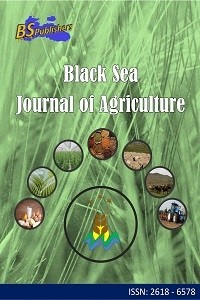
Black Sea Journal of Agriculture
Yazarlar: Wudu Abiye ABEBAW
Konular:Fen
Anahtar Kelimeler:Climate change,Adaptation,Mitigation,Agricultural production
Özet: Climate change is widely considered to be one of the greatest challenges to modern human civilization that has profound socioeconomic and environmental impacts, so the main objective of this is paper is to review climate change adaptation and mitigation measures or practice in agricultural sector. Ethiopia has been identified as one of the most vulnerable countries to climate variability and change, and is frequently faced with climate-related hazards, commonly drought and floods. So there are so many climate change adaptation measures from those building defenses to protect coastal areas from rising seas, switching to drought or flood resistant crop varieties, and improving systems to warn of heat-waves, disease outbreaks, droughts and floods and also the migration measures are efforts to switch from fossil fuels to renewable energy sources such as wind and solar, or to improve energy efficiency. It also includes efforts to plant trees and protect forests, or to farm land in ways that prevent greenhouse gases from entering the atmosphere. Climate change mitigation generally involves reductions in human (anthropogenic) emissions of greenhouse gases (GHGs) Mitigation may also be achieved by increasing the capacity of carbon sinks, e.g., through reforestation. Impacts of climate change to crop sector include decreasing in both productivity/yield and cultivable land (in some crops like maize shifted from lowland areas to highland areas; while, barley since it is a highland crop, due to climate change its cultivable land diminished and productivity decreased) due to high temperature and water deficit. In addition, the water sector of the country gets impacted negatively by climate change by decreasing soil water, ground water and stream flow due to high evapotranspiration in some areas. To alleviate these negative impacts of climate change, different climate change adaptation and mitigation strategies practiced in different areas of the country. Extreme weather events, combined with a low capacity to adapt to the adverse impacts of climate change, aggravate food security risks, due to shortage of rainwater/changes in rainfall patterns, exposed to flooding /erosion, declining soil fertility, decline in productivity, reduced yield, food insecurity.